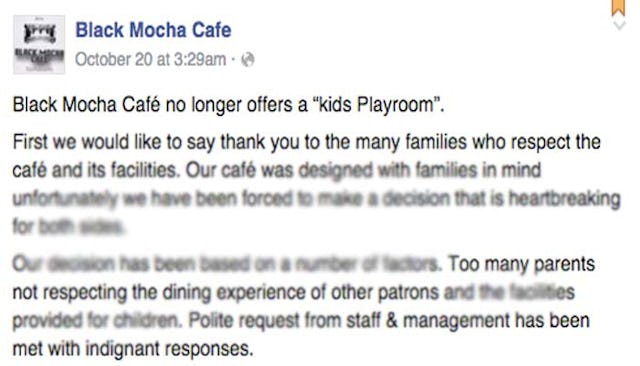Cafe Forced To Close Playroom Because Some Parents Refuse To Parent

The majority of us know that just because a cafe has some high chairs and toys, doesn’t mean it’s a kids-gone-wild free-for-all. Alas, there are still those who don’t, and restaurants who welcome kids end up paying the price.
A cafe in New South Wales, Australia had to close the playroom it provided for families with children, after some seriously horrendous behavior. The restaurant detailed the reason for its decision on its Facebook page this week.
The owners of the Black Mocha Cafe explained they designed their cafe with families in mind, so they offered a changing table in the bathroom, some toys and books for children, a play area, and a kids menu. But offering so many perks for parents quickly made the atmosphere at the restaurant go south. They explain:
Since opening, the café has been subjected to:
– Children ripping books, breaking toys and drawing on the walls
– Kids chewing and tearing open sugar packets and emptying them onto the floor, tables, chairs and carpet as well as grinding food into the carpet, books, walls and toys. – Kids using furniture as trampolines and kicking fixtures and fittings. – Kids running and screeching unsupervised around the cafe jumping on the furniture, screaming; just for fun and often encouraged by their parents. – Kids knocking over HOT tea & coffee, washing their hands in other patrons’ water glasses and taking food off other patrons’ plates. – Parents bringing in takeaway food to eat and using cushions as plates. – Parents changing nappies on lounges, the table tops and the carpet in the kids play room and then placing dirty nappies on top of dining tables or leaving them in the play room.
This sounds crazy, right? It’s not. I am absolutely, 100% sure that all of these things really happened. Why? I worked in a “family-friendly” neighborhood restaurant in Brooklyn for years. Fact: some parents are a goddamn nightmare.
No matter what “perks” a restaurant provides for children, it’s still an establishment that serves food. There are health laws that govern such places, as well as common sense laws. Okay, so the latter doesn’t exist, but it should. So many common sense laws are broken by parents who visit restaurants with their spawn in tow.
In my experience, parents would regularly allow their children to run around the restaurant — sometimes shoeless. Some would let their kids perch menacingly atop benches adorned with decorative pillows — I would watch in horror, certain the kids were about to go face-first into our tile flooring. There are always those parents who allow their “adorable” kids to approach and talk to neighboring tables. Just because you think your child is the funniest, most adorable thing in the world, doesn’t mean that couple who never gets a date night sitting next to you wants to interact with them. Then there’s the freaking sugar packets. Those aren’t toys, and they actually become a sticky nightmare to clean up. Oh, and the salt and pepper shakers? Regularly licked. Only saw a mom change a diaper once – but that was enough.
It’s not a restaurant’s job to remind parents how to adult. It is however, a parent’s job to remind their child how to appropriately act in public. The Black Mocha Cafe was forced to close a portion of its cafe that was built with families in mind, because the area was abused more than it was appreciated. Here are a few photos of the space:
Image via Facebook/ Black Mocha Cafe
Image via Facebook/ Black Mocha Cafe
There are plenty of parents who will miss this space, taken from them by the actions of a few. The cafe concluded their Facebook announcement with this:
“We feel that it’s the parent’s responsibility to keep their children reasonably quite and well-behaved during their visit to the café. But when parents can’t be bothered to do this, there comes a point when the café has to act in the best interest of its patrons as a whole.”
“In the end it became a choice between the playroom or the business,” owner Joel Osterberg told Fairfax Media.
“Two screaming children can actually empty that cafe in the space of 15 minutes. And we can’t do that to our other loyal customers. It was seriously hurting our business.”
This article was originally published on